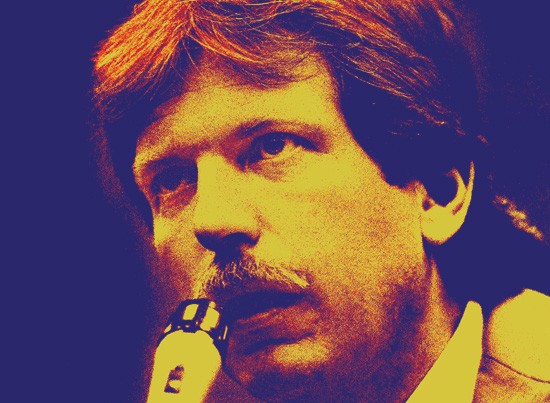
A few months after Gary Webb killed himself with his dad's old pistol, I stood shirtless in my back yard, staring at the full moon. The sky was black and cloudless, the moon blurry. Earlier that night, I'd poured myself several splashes of single-malt scotch. I shook my fist in the air and screamed.
I'd been a mess ever since Dec. 12, 2004, when the Sunday-morning edition of the Los Angeles Times hit my porch. As usual, I had opened the paper to the last page of the news section, where the Times tended to bury its most important stories. “Gary Webb, 49, wrote series linking CIA and drugs,” read the headline, and suddenly I realized I was reading an obituary. Webb, the article stated, who “wrote a widely criticized series linking the CIA to the explosion of crack-cocaine in Los Angeles, was found dead in his Sacramento-area home Friday. He apparently killed himself.”
]
Eight years earlier, in August 1996, Webb had published his “Dark Alliance” series in the San Jose Mercury News. The three-parter accused the CIA of helping spark the crack cocaine epidemic of the 1980s. Its central claim: The CIA helped spread crack through the Nicaraguan Contras, right-wing rebels who aimed to overthrow the Soviet Union-supported Sandinista government. The nation's major media outlets initially ignored Webb's big story. But because it was the first such exposé that ran simultaneously in print and online, and because its explosive scoops exposed the supposed stewards of journalism–The New York Times, Washington Post, Wall Street Journal, but especially the Los Angeles Times–as being asleep at the wheel, the series provoked a firestorm of controversy.
The fact that a Nicaraguan smuggler and contra fund-raiser named Danilo Blandon had for years supplied LA's biggest crack kingpin, Freeway Ricky Ross, with cheap Colombian cocaine made the story all the more explosive. African-Americans, who had long suspected the government played a hidden role in the cocaine-fueled carnage in their communities, were particularly outraged. The Congressional Black Caucus held hearings led by Congresswoman Maxine Waters, whose South Central district was the most impacted by the drug plague. Then-CIA director John Deutsch flew to a packed South LA high school auditorium and insisted he would get to the bottom of Webb's allegations.
Having mostly downplayed evidence of CIA complicity with drug dealers in the 1980s, the nation's major media outlets could no longer ignore Webb's story. Within a few months, the Post, New York Times and Los Angeles Times published extensive front-page stories on the subject–by attacking his work, assigning dozens of reporters to target Webb's series instead of advancing his findings. Rather than objectively investigate, they debunked claims–such as the CIA inventing crack–that Webb never made. Eventually, other newspapers dug through his two-decade professional career, looking for any evidence of bias.
Webb became the story, and it destroyed him. But that wouldn't cut it for me. The morning after I learned of his death, I drove to the OC Weekly offices in Santa Ana. It was my turn to write up Webb's obituary. The first three words I typed on my computer became my headline: “Kill the Messenger.”
* * *
In August 1996, I was a 26-year-old cub reporter at the Weekly. I covered cops, crimes, gangs, the war on drugs. I idealistically viewed my job as an opportunity to challenge authority, put a spotlight on corruption and expose injustice, albeit on a small scale for a local paper. When I first read “Dark Alliance,” the story represented everything about journalism I admired and wanted to do. Webb seemed to have blown the lid off a massive government cover-up that went to the very heart of the war on drugs and took on the most powerful and secretive agency in the country.
The investigative reporter in me also noticed that one of the key members of the Blandon/Ross drug ring was a former Laguna Beach police officer named Ronald Lister. Lister had allegedly provided weapons and security equipment such as Uzis and police-radio scanners to Blandon, who in turn gave them to Ross. “We had our own little arsenal,” Ross told Webb. “Once, [Blandon] tried to sell [my partner] a grenade launcher. I said, 'Man, what [the fuck] do we need with a grenade launcher?'”
With help from the Mercury News, I reached Webb by telephone at his hotel room in Washington, D.C., where he was making the rounds of political talk shows. He was a star reporter, an inspiration. The Pulitzer was his for the losing. I told Webb that I wanted to know more about Lister, since I was in a position to follow up on Webb's reporting. Webb told me that Lister had just been released from federal prison for drug trafficking and had rebuffed his interview requests. He seemed certain, however, that Congress was going to force the CIA to come clean about the contras and crack cocaine. Webb was ready to keep writing–and he didn't mind if I tagged along. “There's plenty more good stuff coming,” he promised.
Lister was maybe the most interesting character in the allegedly CIA-tied drug ring Webb had uncovered. In October 1986, dozens of LA County Sheriff's deputies and narcotics cops raided the Blandon/Ross drug ring, hitting locations throughout Southern California, including Lister's mountain house in Crestline and his suburban pad in Mission Viejo. When Lister opened the door, he didn't seem surprised. “You're making a big mistake,” he announced to the officers. “There's a bigger picture out there.”
[
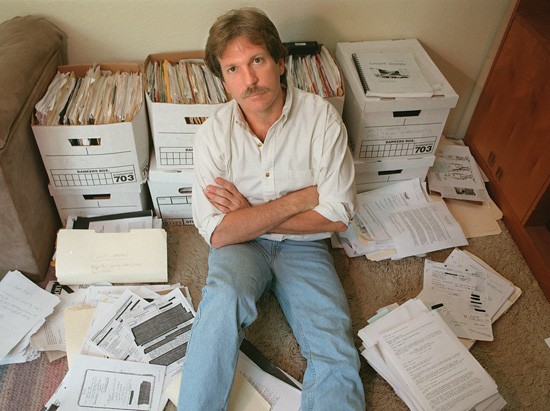
Inside, deputies found a trove of evidence of Lister's international arms deals and security work. His clients included people such as General Jose Guillermo Garcia, then El Salvador's defense minister, and Roberto D'Aubuisson, a right-wing politician and reputed leader of the Salvadoran death squads. According to “Dark Alliance,” before they left–without arresting him because there were no drugs in the house–Lister picked up a telephone and threatened to report the officers to his friend “Scott Weekly” in the CIA.
Weekly was a notorious figure in paramilitary circles during the 1980s, an intense, bearded explosives expert nicknamed “Dr. Death” who had attended the U.S. Naval Academy in the same class as Oliver North. Hoping to get some clarification about Lister, I drove to San Diego and knocked on Weekly's front door. Nobody answered. I peeked over his fence. Suddenly, the door blew open and a man I immediately recognized as Weekly rushed toward me, clad in a T-shirt and shorts, his fists clenched. I held up my reporter's notebook and promised I was unarmed. He retreated inside, shut his door and refused to talk.
Eventually, I discovered through another source that Lister had met Weekly at a San Diego gun shop, Lafrance Specialties. Shop owner Tim Lafrance told me how he and Lister had traveled to El Salvador in 1982 to demonstrate weapons for the military. He said Lister's security company was a CIA front and the State Department had approved the export license for his weapons in just days instead of weeks.
Now, I had a source backing up everything Webb had reported about the CIA having ties to the Blandon/Ross drug ring–exactly the type of scoop that would force other media organizations to take notice. I called Webb to fill him in about Lafrance's claims. A few days later, he called me back.
“You have no idea how right you are,” he said. Webb told me he'd found Lafrance's and Weekly's names while poring through microfiche copies of evidence relating to U.S. Senator John Kerry's 1989 subcommittee investigation into CIA-contra drug smuggling. “You go look for it,” he added, chuckling.
Another name in Lister's confiscated notes was even more compelling: Bill Nelson. In the 1970s, Nelson had been the deputy director of covert operations for the CIA. After his retirement, he became security chief for Fluor Corp., the massive engineering company whose headquarters were in Irvine at the time. Nelson died in 1995, but FBI reports I obtained through a Freedom of Information Act (FOIA) request showed that Lister had worked closely with Nelson on various projects throughout the 1980s, although the exact nature of the work was censored to protect U.S. national security. The Weekly eventually sued the CIA to turn over more documents, which revealed the FBI had investigated Lister several times for his international arms deals. At some point, Nelson had apparently broken off his relationship with Lister, telling Lister that nobody at the CIA would be able to help him until he “cleared” himself with the FBI–a strange conversation considering that now, in the wake of Webb's reporting, the CIA was strenuously denying any relationship to Lister.
Meanwhile, working with Webb's Nicaragua-based investigator, Georg Hodel, I followed up on the money-laundering operation Lister had set up for the Blandon/Ross drug ring. For weeks, I dug into a complex web of Florida corporations, banks and real-estate deals that appeared related to that effort. I shared my findings with Webb, who excitedly brought them to his editors, insisting he be allowed to continue his reporting. He even urged me to apply for a job with the Mercury News and gave me the direct line of one of his editors.
Now I wasn't just helping a star reporter advance the story of a lifetime; my own career looked wide open. But when the nation's most powerful news organizations attacked “Dark Alliance,” my job application went nowhere. Webb's editors not only refused to let him print any more stories, but they assigned another reporter to dig into “Dark Alliance,” as well. In May 1997, after that reporter failed to uphold Webb's work, the Mercury News printed a letter to readers, backing off the story. When Webb publicly accused his editors of cowardice, they banished him to the paper's tiny Cupertino bureau.
After a few months of writing stories about flatulent police horses (published without his byline, at Webb's insistence), he quit his job and never worked in daily journalism again. He'd passed up on six-figure book deals out of loyalty to his newspaper, but when he finally published Dark Alliance, the hard-cover version of his series, it was for Seven Stories Press, best known for its annual “Project Censored” compendium of overlooked investigative reporting. The book was alternately ridiculed or ignored by the mainstream press.
It was on Webb's 1998 promotional tour that I finally met him at a book signing at the since-closed Midnight Special bookstore in Santa Monica. Webb still seemed determined to get his story out to the public and set the record straight about the CIA, the contras and crack cocaine, but I could see in his beleaguered eyes as he spoke to the crowd that he was a man all but defeated. At one point in his speech, Webb explained that he never said and never believed the CIA had intentionally addicted anyone to crack. Several people booed. One woman jumped up and pointed her finger at Webb. “The police invented crack,” she shouted.
“No, they didn't,” Webb responded. “What happened was this drug ring, which the CIA has now admitted it protected, arrived in South Central at a particularly bad time, in 1982. It hooked up with the gangs right when people in South Central were learning how to turn powder cocaine into crack.”
“Don't try to tell us that,” the woman persisted. “The police invented that drug.”
“I think we all appreciate what you've done, but we just want you to tell the whole truth about the CIA,” another audience member interjected.
Webb didn't win back the crowd until Maxine Waters suddenly appeared out of nowhere and gave him a big, sympathetic hug.
I kept in regular touch with Webb over the years, calling him every time the CIA or FBI mailed me a new packet of ancient, redacted files. I published some follow-up stories on the mysterious Lister, but as those discoveries grew less frequent, so did my contact with Webb. I knew he was trying to sell a film or television version of his story to Hollywood because his journalism career was finished. He invited me to grab a beer on one of those trips, but his meeting fell through, so we never met up. When I learned Webb had taken a job with the Sacramento News & Review, a small alt-weekly, I left him a voice mail congratulating him on his new job. He never responded. A month or so later, he was dead.
[
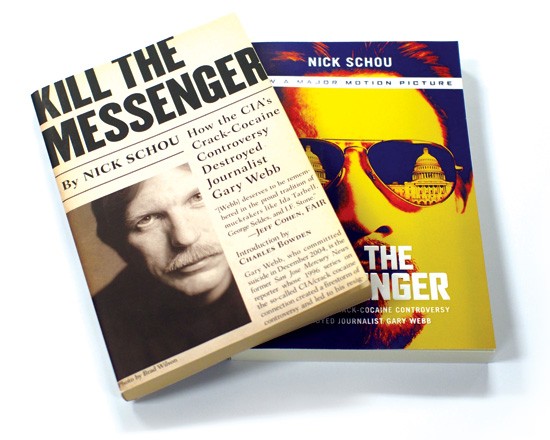
About half a year after Webb committed suicide, I wrote to his widow, Sue Bell Stokes, and asked her permission to write his biography. I told her I didn't want the Los Angeles Times to get the last word with its obituary. In truth, I wanted to write a book about Webb because I was terrified about what his suicide said about my own involvement with the story. I'd invested years in chasing after the truth, long after Webb himself had lost hope. Could it really have all been for nothing?
Because she remembered Webb talking favorably about me, she agreed. Getting the book published was another story. Despite crucial help from historian Mike Davis, author of City of Quartz and Planet of Slums, no literary agent would represent me, arguing that Webb's story, while tragic, wouldn't find a nationwide audience. After rejections too numerous to count, Nation Books happily signed on to the project, paying me a modest advance that helped to cover my travel budget and lost wages from the month I took off to write the book.
First, I flew to Sacramento to interview Stokes; Webb's oldest son, Ian; and Webb's mother, who was the last person to see him alive. With Stokes' help, I was able to track down scores of sources, everyone from Webb's childhood friends to work colleagues, all of whom respected and even revered him for his courage as a reporter and were aghast at how the mainstream media had left his reputation in shambles.
I reached out to everyone involved in the media's attack on “Dark Alliance,” as well as everyone at the Mercury News who either knew Webb or was involved in the editing of the story. I intended to give fair voice to everyone, regardless of their role. The only person I regretted interviewing was Webb's former Mercury News editor, Scott Herhold. He rudely told me he would talk for exactly five minutes. He then proceeded to detail a litany of petty complaints about Webb's personality. Finally, Herhold told me that I had 30 seconds left to ask questions. “No, thanks,” I told him before hanging up the telephone.
Nation Books arranged for Charles Bowden, who authored “The Pariah,” a masterful profile of Webb for Esquire in 1998, to write a forward to my book. (Bowden, who tragically passed away last month, kindly shared notes from his interview with Webb; these further confirmed the depths of his despair and determination). Kill the Messenger finally hit the stands in paperback form in October 2006. “Hit the stands” is a bit of an overstatement: Barnes & Noble (as well as some bookstore chains that don't exist anymore) refused to stock the book.
My tour began at a small independent bookstore in Davis, a college town. It was a Friday night. Other than Stokes, Ian and a couple of Webb's hockey buddies, the only other audience member was a homeless guy who wandered in and fell asleep on a chair, snoring loudly. My next stop was at a bookstore in a San Jose shopping mall. There was a nice poster of the book's cover and a dozen or so empty seats within spitting distance of a crowded café. After several desperate pleas over the intercom by a store manager, a tiny crowd finally assembled.
The whole thing would have been even more depressing had Hollywood not already expressed an interest in making a movie based on Kill the Messenger. Peter Landesman, a former investigative reporter, contacted me a few months before the book's publication, eager to write a script. Landesman had followed what happened to Webb and had been through the same process of media attacks following a 2004 exposé he wrote for The New York Times Magazine on international sex trafficking, a topic now au courant in the media but dismissed then as shock journalism. Two years later, Universal Studios bought the option, but let it lapse after a couple of movies about reporters bombed at the box office.
Another six years would pass before Landesman called me to say that Jeremy Renner wanted to produce and star in the film. Still, I didn't believe anything would come out of this until August 2013, when I flew to Atlanta to join the shoot for Kill the Messenger.
The crew had set up inside the shuttered Georgia State Archive building, with various floors turned into sets of the Mercury News, Washington Post, New York Times and Los Angeles Times. Renner, who seemed to enjoy pacing the hallways and startling passersby, was nice enough to thank me for coming; director Michael Cuesta kindly used me as an extra, playing a Mercury News editor in a couple of scenes. There I stood, dressed in exactly the same mid-'90s Gap clothing–checkered button-down shirt and khaki slacks–that I'd worn as a young reporter chasing after Webb's story 17 years earlier.
That Kill the Messenger (officially based on my book and Webb's own tome) finally found its way to the silver screen is the happy ending that Webb never lived to see. In articles penned to the film's release, both The New York Times and LA Times published pieces acknowledging that Webb's legacy has been “re-evaluated” and “largely vindicated.” In 2013, I wrote how Jesse Katz, one of the reporters who helped the LA Times demolish Webb's reputation, now described the paper's treatment of Webb as “tawdry.”
Although it's admittedly a stretch to say it's a consensus, the emerging view of Webb is that he represented the guts of a profession that has steadily declined ever since his peers ripped apart one of their own for doing the job right. Meanwhile, given the string of scandals involving government wrongdoing in recent years–everything from torture to shadowy bailouts to widespread eavesdropping–Webb now seems like exactly the kind of reporter this country should cherish rather than destroy.
* * *
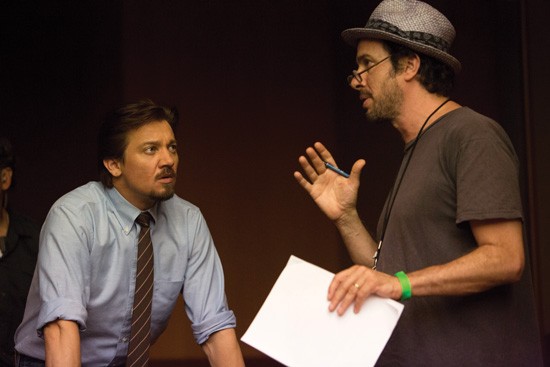
A story as complex as “Dark Alliance” has more than its share of loose ends, many of which continue to linger.
A few weeks before Kill the Messenger's debut, I got a call from Richard Love, one of the LA County sheriff's deputies who had raided Lister's house. He was retired and living in rural Colorado and had just learned about the movie. He wanted to talk to me about the raid on Lister and the rest of his cohorts, including Blandon and Ross.
According to Love, he and his partners were briefed for the raids on a Friday afternoon but, for some reason, didn't roll out until Monday morning, which had never happened before. It didn't surprise him that when they carried out the operation, all of their targets seemed to have just finished moving large quantities of cocaine to other locations.
“Somebody tipped them all off,” Love told me. “Lister was cool. He acted like he was protected. He talked all about drugs being sold, how he'd flown in an airplane down to Nicaragua with Ollie North and brought guns down there. Then he kind of backed off and danced around things. I think he realized he'd talked too much.”
The day after Love called, I texted Lister, asking him to meet me for drinks. I told him I wanted to talk to him about Gary Webb and his big story, whether he was right or wrong, and that the interview had to be on tape.
We met for lunch in Long Beach. It was a tradition that had begun in 2007, a year after my book was published, when a source of mine, an ex-cop who'd worked with Lister in Laguna Beach, had given me Lister's telephone number. The hair on the back of my neck stood up when we first met, as he casually talked about his involvement with Salvadoran army generals and death squad leaders. Then there was the time the DEA arrested a team of Colombian cartel assassins at the San Clemente immigration checkpoint who were on their way to kill Lister over an unpaid debt.
Now, years later, we chatted over a meal of sushi and beer about Lister's involvement in the Iran-contra scandal. He claimed to have testified about his involvement in still-classified Senate subcommittee hearings held decades earlier. At the time, Lister had tried to shave years off his sentence by telling a judge he'd spilled the beans on “certain key figures” alleged to be involved in Iran-contra. There was no way he was going to name names to me, though, given that his testimony was still classified to protect U.S. national security.
While Lister denied he had mentioned Oliver North to Love during the raid on his house, he acknowledged that he had a close business relationship with ex-CIA deputy director Nelson. He claimed that another security professional who knew Nelson had recruited him to travel to El Salvador and provide security services to the Salvadoran military, a mission, the man told him, that was approved by an unspecified government agency. “I wouldn't know a CIA agent from a postal inspector,” Lister said.
When I brought up Lister's work with death-squad founder D'Aubuisson, he opened his collar and showed me a Jesuit cross hanging round his neck. “I was a consultant for him, and it just so happened that he was the founder of the death squads,” Lister said, shaking his head.
“I used to walk with the Devil,” Lister continued. “Now I walk with God.” Apparently, this was a saying he'd learned from his Central American army and death-squad buddies, most of whom had turned to religion when the civil wars ended. “Like I told the Senate subcommittee, we were just trying to help the contras. It was a romantic and exciting thing to help these guys against the Sandinistas, the comunistas. As a private citizen, I thought it was fun.”
Cagey as ever–but I needed to know, once and for all. When I first met Lister, he had claimed Webb was on the right track with “Dark Alliance,” although he didn't want to say so on tape. He still felt that way now, years later–and now, he was ready to say that on the record.
“Gary Webb was probably an exceptionally good journalist because of his passion,” Lister told me. “He dug deeper and deeper and got to a point where probably things didn't make sense to him and it was just a big puzzle.”
What ruined Webb, Lister believes, is that he didn't know when to stop. Many government investigators who came before Webb had backed off when they realized who they were going up against.
“A lot of times people get so deep into something, maybe it's not going to work out for them because it goes against the system,” Lister observed. “Many of them were probably told exactly what Gary was told, and most of them, you know, listened when they were told, 'Leave it alone.' People like Gary didn't.”
Follow OC Weekly on Twitter @ocweekly or on Facebook!
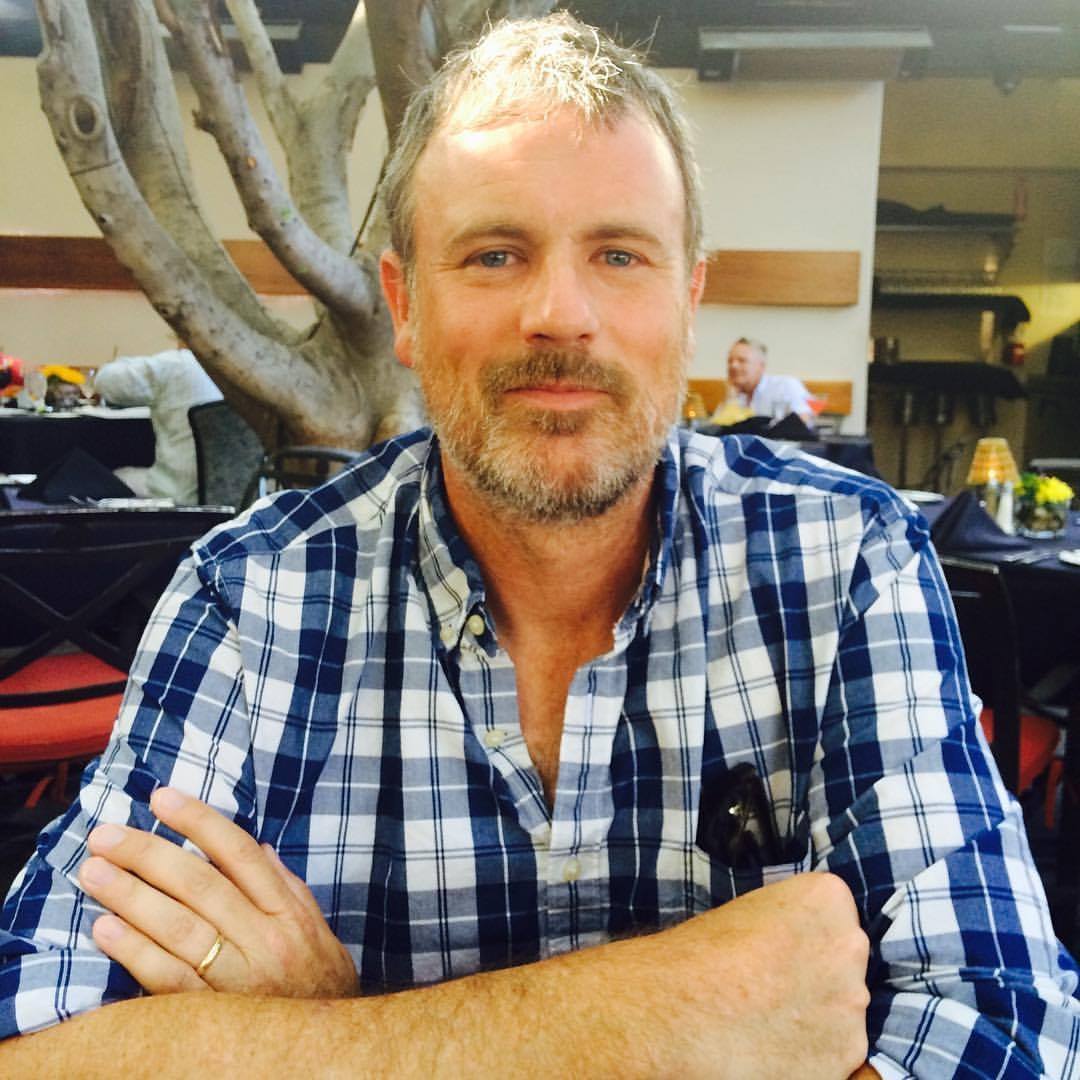
Award-winning investigative journalist Nick Schou is Editor of OC Weekly. He is the author of Kill the Messenger: How the CIA’s Crack Cocaine Controversy Destroyed Journalist Gary Webb (Nation Books 2006), which provided the basis for the 2014 Focus Features release starring Jeremy Renner and the L.A. Times-bestseller Orange Sunshine: The Brotherhood of Eternal Love’s Quest to bring Peace, Love and Acid to the World, (Thomas Dunne 2009). He is also the author of The Weed Runners (2013) and Spooked: How the CIA Manipulates the Media and Hoodwinks Hollywood (2016).


One Reply to “Gary Webb: Pariah No More”